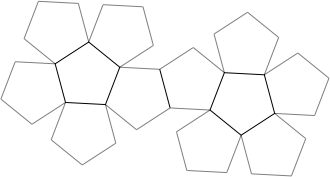 Dodecahedron: A Platonic solid composed of twelve pentagonal faces, with three meeting at each vertex. It has twenty vertices and thirty edges. Definition from Wikipedia.org
Dodecahedron: A Platonic solid composed of twelve pentagonal faces, with three meeting at each vertex. It has twenty vertices and thirty edges. Definition from Wikipedia.orgPaul Glennon’s The Dodecahedron or A Frame for Frames: a novel of sorts is composed of twelve short stories, each representing one of the pentagonal faces of a dodecahedron. The key to understanding this unique work is in the subtitle: “a novel of sorts.” Instead of creating a series of unrelated short stories, Glennon has added a new dimension to his work by applying Oulipian principles (OuLiPo is a group of French authors who create literature based on arbitrary constraints of their own making) to his collection. Glennon explains these principles in the book’s afterword:
“Each chapter was to be as self-contained and whole as any short story. As in a story cycle, each story would cast a new light on the ones that preceded it, and promote a novel-like unity of themes. What I did not want to write was a cyclical book, in which the final story is the final word, a story with more authority than all others, one that casts a sort of judgment on the rest…I envisioned a book in which each of the twelve chapters or stories represented a face of the dodecahedronA further constraint Glennon puts on his work is also best explained by his own words:…In A Frame for Frames these sides represent a relationship to an adjacent story…Each story must refer to or be referred to by each of the five stories adjacent to it.”
“A dodecahedron has twenty vertices, points where three sides meet. In A Frame for Frames these vertices are represented by certain repetitions and recurrences in each of the three stories that meet in these points. If the elements that represent the vertices were extracted and placed in the order of their first appearance, they would form another text of sorts, which might provide another perspective for evaluating the whole.”Glennon’s stories cover a wide range of genres; diaries of adventurers, conspiracy theories, academic essays, all leading to unexpected connections. The stories, as stand-alone tales, are entertaining but it is in their interlacings that they become luminous. A Frame for Frames consists of stories about stories, adding both a platform on which to build this three dimensional creation, and the invisible conception itself. Readers will be tempted to create a dodecahedron of their own to unravel Glennon’s creation.
 The ethereal creations arise, like the shadow child in “Why Are There No Penguins?”, taunting the reader with half-realized ideas. Even if the reader never sees the creation Glennon intends, the hallucinatory threads invented by the mind are magical in their own right.
The ethereal creations arise, like the shadow child in “Why Are There No Penguins?”, taunting the reader with half-realized ideas. Even if the reader never sees the creation Glennon intends, the hallucinatory threads invented by the mind are magical in their own right.Hallucination and dream states exist throughout these stories, most apparently being in “Tenebrian Chronicles” where monks spend months each year dreaming the histories and world events they later inscribe as fact.
Glennon introduces his readers to a profound journey of the mind and senses; one that will remain in their minds as clearly as if they had eaten the pages of this mesmerizing book, like the hero in the lead story “In My Father’s Library.” The quote by Francis Bacon, which prefaces "Library," could easily be applied to the entirety of A Frame for Frames: “Some books are to be tasted, others to be swallowed, and some few to be chewed and digested.”
No matter how the reader dips into The Dodecahedron or A Frame for Frames: a novel of sorts, this book will remain with them long after the final page is consumed.
See the review posted at ReadySteadyBook.
ISBN10: 0889842752
ISBN13: 9780889842755
Publisher: The Porcupine’s Quill
Publication Date: September 2005
Binding: Paperback
The book's cover image is a photograph of a room in the Collegium Maius, Cracow, Poland, where Copernicus studied in 1502, taken by Erich Lessing. The dodecahedron illustrations are from Wikipedia.org.
Related Books:
* 3 by Perec (Includes La Disparition [The Void], a novel written entirely without the letter E) by Georges Perec
* If On a Winter's Night a Traveller (Se Una Notte d'Inverno un Viaggiatore) by Italo Calvino
* Ella Minnow Pea by Mark Dunn
tags: books book reviews Dodecahedron Paul Glennon Experimental Literature Oulipian Principles OuLiPo Platonic Solid


2 comments:
This sounds wonderful; a definite must for my wishlist. :-) I come here and always get a recommendation for something obscure and juicy...as my bibliomania needed yet more fuel!
Thanks Victoria, you have me blushing. I go to your litblog for your indepth reviews. ;-)
Stay tuned, I have a great review coming for all bibliophiles!
Post a Comment